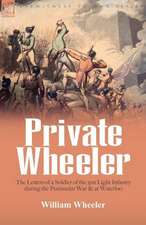Warriors: Portraits from the Battlefield
Autor Max Hastingsen Limba Engleză Paperback – 28 feb 2007
| Toate formatele și edițiile | Preț | Express |
|---|---|---|
| Paperback (2) | 82.75 lei 3-5 săpt. | +12.50 lei 5-11 zile |
| HarperCollins Publishers – 6 mar 2006 | 82.75 lei 3-5 săpt. | +12.50 lei 5-11 zile |
| Vintage Books USA – 28 feb 2007 | 142.77 lei 3-5 săpt. |
Preț: 142.77 lei
Nou
Puncte Express: 214
Preț estimativ în valută:
27.32€ • 28.42$ • 22.56£
27.32€ • 28.42$ • 22.56£
Carte disponibilă
Livrare economică 24 martie-07 aprilie
Preluare comenzi: 021 569.72.76
Specificații
ISBN-13: 9780307275684
ISBN-10: 030727568X
Pagini: 354
Ilustrații: 16 PP PHOTOS AND 10 MAPS
Dimensiuni: 134 x 203 x 20 mm
Greutate: 0.36 kg
Editura: Vintage Books USA
ISBN-10: 030727568X
Pagini: 354
Ilustrații: 16 PP PHOTOS AND 10 MAPS
Dimensiuni: 134 x 203 x 20 mm
Greutate: 0.36 kg
Editura: Vintage Books USA
Notă biografică
Max Hastings was a foreign correspondent and the editor of Britain's Evening Standard and The Daily Telegraph. He has presented historical documentaries for BBC TV, and is the author of eighteen books, including Bomber Command, which earned the Somerset Maugham Award for nonfiction, The Korean War, and Overlord: D-Day and the Battle for Normandy, 1944. He is also the author of the recently published Armageddon: the Battle for Germany, 1944-1945. He is recipient of numerous British Press Awards, including Journalist of the Year (1982), Editor of the Year (1988). He lives outside of London.
Extras
BONAPARTE’S BLESSED FOOL
THE WARS OF NAPOLEON produced a flowering of memoirs, both English and French, of extraordinary quality. Each writer’s work reflects in full measure his national characteristics. None but a Frenchman, surely, could have written the following lines about his experience of conflict: “I may, I think, say without boasting that nature has allotted to me a fair share of courage; I will add that there was a time when I enjoyed being in danger, as my thirteen wounds and some distinguished services prove, I think, sufficiently.” Baron Marcellin de Marbot was the model for Sir Arthur Conan Doyle’s fictional Brigadier Gerard: brave, swashbuckling, incapable of introspection, glorying without inhibition in the experience of campaigning from Portugal to Russia in the service of his emperor. Marbot was the most eager of warriors, who shared with many of his French contemporaries a belief that there could be no higher calling than to follow Bonaparte to glory. Few modern readers could fail to respect the courage of a soldier who so often faced the fire of the enemy, through an active service career spanning more than forty years. And no Anglo-Saxon could withhold laughter at the peacock vanity and chauvinism of the hussar’s account of the experience, rich in anecdotage and comedy, the latter often unintended.
Jean-Baptiste-Antoine-Marcellin de Marbot was born in 1782 at Beaulieu in the Corrèze, son of a country gentleman of liberal inclinations who became a general in France’s revolutionary army. With his round face and snub nose, the child Marcellin was known to his family as “the kitten,” and for some years during the nation’s revolutionary disorders attended a local girls’ school. He was originally destined for a naval career, but a friend urged his father that life aboard a warship mouldering in some seaport under British blockade was no prospect for an ambitious youth. Instead, in 1799 a vacancy was procured for him in the hussars. The seventeen-year-old boy was delighted, and from the outset gloried in his new uniform. His father, however, was uneasy about his shyness, and for some time was prone to refer to his son in company as “Mademoiselle Marcellin”—rich pickings there for a modern psychologist. In those days when every hussar was expected to display a moustache as part of his service dress, the beardless teenager at first painted whiskers on his face.
Marbot met Bonaparte for the first time when accompanying his father to take up a posting with the army in Italy. They were amazed to encounter the hero of the Pyramids at Lyons, on his way back to Paris from Egypt, having abandoned his army to seek a throne, a quest to which General Marbot, a committed republican, declined to give his assistance. In Italy, young Marcellin won his spurs. Despatched with a patrol to seize Austrian prisoners, the sergeant in command professed sudden illness. The boy seized the opportunity and assumed leadership of the troop: “When . . . I took command of the fifty men who had come under my orders in such unusual circumstances, a mere trooper as I was and seventeen years old, I resolved to show my comrades that if I had not yet much experience or military talent, I at least possessed pluck. So I resolutely put myself at their head and marched on in what we knew was the direction of the enemy.”
Marbot’s patrol surprised an Austrian unit, took the necessary prisoners, and returned in triumph to the French lines where their self-appointed commander was rewarded with promotion to sergeant, followed soon afterwards by a commission. He survived the terrible siege of Genoa, where his father died in his arms following a wound received on the battlefield. Soon afterwards the young man was posted to the 25th Chasseurs. In 1801 he was appointed an aide-de-camp to that hoary old hero Marshal Augereau, with whom he travelled for the first time to the Iberian Peninsula.
By 1805, already a veteran, Marbot was an eager young officer with Bonaparte’s Grand Army, ready for a summer of campaigning against the Austrians and Russians. “I had three excellent horses,” he enthused, adding bathetically, “and a servant of moderate quality.” The duties of aides-de-camp were among the most perilous in any army of the time. It was their business to convey their masters’ wishes and tidings not only across the battlefield, but from end to end of Europe, often in the teeth of the enemy. In the period that followed, writes Marbot, “constantly sent from north to south, and from south to north, wherever there was fighting going on, I did not pass one of these ten years without coming under fire, or without shedding my blood on the soil of some part of Europe.” It is striking to notice that, until the twentieth century, every enthusiastic warrior regarded it as a mark of virility to have been wounded in action, if possible frequently. A soldier who avoided shedding his own blood, far from being congratulated on luck and skill, was more likely to be suspected of shyness.
Marbot began the 1805 campaigning season by carrying despatches from the emperor to Marshal Masséna in Italy, through the Alpine passes. Then he took his place beside Augereau for what became the Austerlitz campaign. “Never had France possessed an army so well-trained,” he exulted, “of such good material, so eager for fighting and fame . . . Bonaparte . . . accepted the war with joy, so certain was he of victory . . . He knew how the chivalrous spirit of Frenchmen has in all ages been influenced by the enthusiasm of military glory.” Seldom has there been an era of warfare in which officers and soldiers alike strove so ardently for distinction. If there were young blades in Bonaparte’s army who confined themselves to doing their duty, history knows nothing of them. In the world of France’s marshals and their subordinates, there was a relentless contest for each to outdo the others in braving peril with insouciance. Its spirit was supremely captured by the tale of Ney, after the battle of Lutzen, encountering the emperor. “My dear cousin! But you are covered in blood!” exclaimed Bonaparte in alarm. “It isn’t mine, Sire,” responded the marshal complacently, “except where that damned bullet passed through my leg!”
Having survived the carnage at Austerlitz, Marbot found himself among a throng of French officers sitting their horses around Bonaparte on the day after the battle, gazing out on the broken ice of the Satschan Lake, strewn with debris and corpses. Amid it all, a hundred yards from the shore they beheld a Russian sergeant, shot through the thigh and clinging to an ice floe deeply stained with his blood. The wounded man, spying the glittering assembly, raised himself and cried out in Russian, “All men become brothers once battle is done.” He begged his life from the emperor of the French. The entreaty was translated. Bonaparte, in a characteristic impulse of imperial condescension, told his entourage to do whatever was necessary to save the Russian. A handful of men plunged into the icy water, seized floating baulks of timber, and sought to paddle themselves out to the floe. Within seconds they became clumsy prisoners of their frozen clothing. They abandoned efforts to save the enemy soldier, and struggled ashore to save themselves.
Marbot, a spectator, declared that their error had been to brave the water fully clad. Bonaparte nodded assent. The would-be rescuers had shown more zeal than discretion, observed the emperor dryly. The hussar now felt obliged to put his own counsel into practice. Leaping from his horse, he tore off his clothes and sprang into the lake. He acknowledged the shock of the deadly cold, but “the emperor’s presence encouraged me, and I struck out towards the Russian sergeant. At the same time my example, and probably the praise given me by the emperor, determined a lieutenant of artillery . . . to imitate me.” As he struggled painfully amid the great daggers of ice, Marbot was dismayed to find his rival catching him up. Yet he was obliged to admit that alone, he could never have succeeded in his attempt. Together, and with immense labour, the two Frenchmen pushed the wounded Russian on his crumbling floe towards the shore, battering a path through the jumble of ice before them. At last they came close enough for onlookers to throw out lifelines. The two swimmers seized the ropes and passed them around the wounded man, enabling him to be dragged to safety. They themselves, at their last gasp, bleeding and torn, staggered ashore to receive their laurels. Bonaparte called his mameluke Roustan to bring them a glass of rum apiece. He gave gold to the wounded soldier, who proved to be Lithuanian. Once recovered, the man became a devoted follower of the emperor, a sergeant in his Polish lancers. Marbot’s companion in mercy, the lieutenant of artillery, was so weakened by his experience that after months in hospital, Marbot recorded pityingly that he had to be invalided out of the service. The hussar, of course, was back on duty next day.
Marbot saw as much of Bonaparte as any man of his rank through the years that followed. In July 1806 he carried despatches to the French Embassy in Berlin, and returned to report to the emperor in Paris that he had seen Prussian officers defiantly sharpening sabres on the embassy steps. “The insolent braggarts shall soon learn that our weapons need no sharpening!” exclaimed Bonaparte. We may suspect that the emperor viewed Marbot just as his fictional self viewed Gerard in Conan Doyle’s tales—a wonderfully loyal, courageous, unthinking instrument with less guile than a gundog. Marbot himself tells several stories of how he was duped by treacherous foreigners with no understanding of the nobility and dignity of war. Indeed, his contempt for the lack of chivalry displayed by Englishmen, Russians, Austrians and suchlike is matched only by his disdain for their military incompetence. On those freakish occasions when he is forced to acknowledge that lesser breeds prevailed on the battlefield, such misfortunes are invariably attributed either to the enemy’s superior numbers or to the folly of some French subordinate commander. Bonaparte’s soldiers, in Marbot’s eyes, were paragons of courage and honour. We learn little from his narrative of the trail of devastation they wreaked across occupied Europe. To the gallant young officer, as to most of his comrades, Bonaparte was an idol, rather than the ruthless despot who brought misery to millions. Marcellin says nothing in his memoirs of his elder brother Antoine-Adolphe, also a soldier, who was arrested in 1802 for an alleged plot against the ruler of France in favour of a republic.
Marbot fretted about receiving less than his share of glory at Jena in October 1806, but a few months later, at the age of twenty-four, he gained his coveted captaincy. It was in this rank that he served at Eylau in February 1807. The battle prompted one of his most remarkable stories, which sounds more like an experience of Baron Munchausen than that of a French cavalry officer. Marbot was riding a mare named Lisette, whose naturally vicious temperament he had with difficulty suppressed. First his servant, then the captain himself, forced sizzling joints of hot mutton into the horse’s mouth when she sought to attack them. Since these salutory experiences, Lisette had been a model mount. In the midst of the great engagement at Eylau, in which Augereau’s corps suffered severely, Bonaparte sent word to the marshal that he should try to save the 14th Infantry, whose dwindling band of survivors held a hillock in the path of the Russian advance. Two aides spurred forth, to be swallowed up in the chaos and never seen again. Marbot stood next in line. “Seeing the son of his old friend, and I venture to say his favourite aide-de-camp, come up, the kind marshal’s face changed, and his eyes filled with tears, for he could not hide from himself that he was sending me to almost certain death. But the emperor must be obeyed.”
Marbot dashed away. Lisette, “lighter than a swallow and flying rather than running, devoured the intervening space, leaping the piles of dead men and horses, the ditches, the broken gun carriages, and the half-extinguished bivouac fires.” Cossacks turned to pursue Marbot like beaters driving a hare, yet none could catch his racing steed. He reached the frail square formed by the survivors of the 14th, surrounded by dead Russian dragoons and their horses. Amid a hail of fire, the aide passed the order to withdraw. The commanding major shrugged that retreat was impossible. A fresh Russian column was even now a mere hundred paces away. “I see no means of saving the regiment,” said the major. “Return to the emperor, bid him farewell from the 14th of the line, which has faithfully executed his orders, and bear to him the eagle which he gave us and which we can defend no longer.”
Here, couched in language worthy of Macaulay, is the very stuff of the legend of Bonaparte’s army, which Marbot did as much as any man to enshrine for posterity. A Russian cannonball tore through the aide’s hat as he seized the regiment’s eagle and strove to break off its staff, the more readily to bear it to safety. He was so badly concussed by the impact that blood poured from his nose and ears. As the enemy’s infantry closed upon them, doomed soldiers cried out “Vive l’empereur!” Several Frenchmen set their backs against Lisette’s flanks, crowding the mare so tightly than Marbot could not spur her away. A wounded French quartermaster-sergeant fell under her legs, and a Russian grenadier sought to bayonet the man where he lay. The attacker, drunk as Russians always were on battlefields depicted by Marbot, missed his aim. One thrust struck the cavalryman’s arm, another pierced his mount’s flank. Lisette’s latent savagery reawakened, “she sprang at the Russian, and at one mouthful tore off his nose, lips, eyebrows and all the skin of his face, making of him a living death’s head, dripping with blood.” Then the mare surged out of the mêlée, kicking and biting as she went, seizing one Russian officer bodily and eviscerating him. She bolted at full gallop, not checking until she reached Eylau cemetery, where she collapsed from loss of blood. Marbot, himself fainting with pain, slid into unconsciousness.
When the battle was done, he was saved by the merest chance from the mound of snow and corpses in which he lay, incapable of movement. A servant of Augereau’s saw a looter carrying a pelisse which he recognised as that of the general’s aide, and induced the man to lead him to the spot where he had found it. Both mare and rider survived. Marbot wrote archly: “Nowadays, when promotions and decorations are bestowed so lavishly, some reward would certainly be given to an officer who had braved danger as I had done in reaching the 14th Regiment; but under the Empire, for a devoted act of that kind I did not receive the cross [of the Legion of Honour] nor did it ever occur [to] me to ask for it.” Poor man, he was in truth obsessed with promotions and medals. He rejoiced mightily when at last he received the cross from his emperor two years later, at the age of twenty-six.
From the Hardcover edition.
THE WARS OF NAPOLEON produced a flowering of memoirs, both English and French, of extraordinary quality. Each writer’s work reflects in full measure his national characteristics. None but a Frenchman, surely, could have written the following lines about his experience of conflict: “I may, I think, say without boasting that nature has allotted to me a fair share of courage; I will add that there was a time when I enjoyed being in danger, as my thirteen wounds and some distinguished services prove, I think, sufficiently.” Baron Marcellin de Marbot was the model for Sir Arthur Conan Doyle’s fictional Brigadier Gerard: brave, swashbuckling, incapable of introspection, glorying without inhibition in the experience of campaigning from Portugal to Russia in the service of his emperor. Marbot was the most eager of warriors, who shared with many of his French contemporaries a belief that there could be no higher calling than to follow Bonaparte to glory. Few modern readers could fail to respect the courage of a soldier who so often faced the fire of the enemy, through an active service career spanning more than forty years. And no Anglo-Saxon could withhold laughter at the peacock vanity and chauvinism of the hussar’s account of the experience, rich in anecdotage and comedy, the latter often unintended.
Jean-Baptiste-Antoine-Marcellin de Marbot was born in 1782 at Beaulieu in the Corrèze, son of a country gentleman of liberal inclinations who became a general in France’s revolutionary army. With his round face and snub nose, the child Marcellin was known to his family as “the kitten,” and for some years during the nation’s revolutionary disorders attended a local girls’ school. He was originally destined for a naval career, but a friend urged his father that life aboard a warship mouldering in some seaport under British blockade was no prospect for an ambitious youth. Instead, in 1799 a vacancy was procured for him in the hussars. The seventeen-year-old boy was delighted, and from the outset gloried in his new uniform. His father, however, was uneasy about his shyness, and for some time was prone to refer to his son in company as “Mademoiselle Marcellin”—rich pickings there for a modern psychologist. In those days when every hussar was expected to display a moustache as part of his service dress, the beardless teenager at first painted whiskers on his face.
Marbot met Bonaparte for the first time when accompanying his father to take up a posting with the army in Italy. They were amazed to encounter the hero of the Pyramids at Lyons, on his way back to Paris from Egypt, having abandoned his army to seek a throne, a quest to which General Marbot, a committed republican, declined to give his assistance. In Italy, young Marcellin won his spurs. Despatched with a patrol to seize Austrian prisoners, the sergeant in command professed sudden illness. The boy seized the opportunity and assumed leadership of the troop: “When . . . I took command of the fifty men who had come under my orders in such unusual circumstances, a mere trooper as I was and seventeen years old, I resolved to show my comrades that if I had not yet much experience or military talent, I at least possessed pluck. So I resolutely put myself at their head and marched on in what we knew was the direction of the enemy.”
Marbot’s patrol surprised an Austrian unit, took the necessary prisoners, and returned in triumph to the French lines where their self-appointed commander was rewarded with promotion to sergeant, followed soon afterwards by a commission. He survived the terrible siege of Genoa, where his father died in his arms following a wound received on the battlefield. Soon afterwards the young man was posted to the 25th Chasseurs. In 1801 he was appointed an aide-de-camp to that hoary old hero Marshal Augereau, with whom he travelled for the first time to the Iberian Peninsula.
By 1805, already a veteran, Marbot was an eager young officer with Bonaparte’s Grand Army, ready for a summer of campaigning against the Austrians and Russians. “I had three excellent horses,” he enthused, adding bathetically, “and a servant of moderate quality.” The duties of aides-de-camp were among the most perilous in any army of the time. It was their business to convey their masters’ wishes and tidings not only across the battlefield, but from end to end of Europe, often in the teeth of the enemy. In the period that followed, writes Marbot, “constantly sent from north to south, and from south to north, wherever there was fighting going on, I did not pass one of these ten years without coming under fire, or without shedding my blood on the soil of some part of Europe.” It is striking to notice that, until the twentieth century, every enthusiastic warrior regarded it as a mark of virility to have been wounded in action, if possible frequently. A soldier who avoided shedding his own blood, far from being congratulated on luck and skill, was more likely to be suspected of shyness.
Marbot began the 1805 campaigning season by carrying despatches from the emperor to Marshal Masséna in Italy, through the Alpine passes. Then he took his place beside Augereau for what became the Austerlitz campaign. “Never had France possessed an army so well-trained,” he exulted, “of such good material, so eager for fighting and fame . . . Bonaparte . . . accepted the war with joy, so certain was he of victory . . . He knew how the chivalrous spirit of Frenchmen has in all ages been influenced by the enthusiasm of military glory.” Seldom has there been an era of warfare in which officers and soldiers alike strove so ardently for distinction. If there were young blades in Bonaparte’s army who confined themselves to doing their duty, history knows nothing of them. In the world of France’s marshals and their subordinates, there was a relentless contest for each to outdo the others in braving peril with insouciance. Its spirit was supremely captured by the tale of Ney, after the battle of Lutzen, encountering the emperor. “My dear cousin! But you are covered in blood!” exclaimed Bonaparte in alarm. “It isn’t mine, Sire,” responded the marshal complacently, “except where that damned bullet passed through my leg!”
Having survived the carnage at Austerlitz, Marbot found himself among a throng of French officers sitting their horses around Bonaparte on the day after the battle, gazing out on the broken ice of the Satschan Lake, strewn with debris and corpses. Amid it all, a hundred yards from the shore they beheld a Russian sergeant, shot through the thigh and clinging to an ice floe deeply stained with his blood. The wounded man, spying the glittering assembly, raised himself and cried out in Russian, “All men become brothers once battle is done.” He begged his life from the emperor of the French. The entreaty was translated. Bonaparte, in a characteristic impulse of imperial condescension, told his entourage to do whatever was necessary to save the Russian. A handful of men plunged into the icy water, seized floating baulks of timber, and sought to paddle themselves out to the floe. Within seconds they became clumsy prisoners of their frozen clothing. They abandoned efforts to save the enemy soldier, and struggled ashore to save themselves.
Marbot, a spectator, declared that their error had been to brave the water fully clad. Bonaparte nodded assent. The would-be rescuers had shown more zeal than discretion, observed the emperor dryly. The hussar now felt obliged to put his own counsel into practice. Leaping from his horse, he tore off his clothes and sprang into the lake. He acknowledged the shock of the deadly cold, but “the emperor’s presence encouraged me, and I struck out towards the Russian sergeant. At the same time my example, and probably the praise given me by the emperor, determined a lieutenant of artillery . . . to imitate me.” As he struggled painfully amid the great daggers of ice, Marbot was dismayed to find his rival catching him up. Yet he was obliged to admit that alone, he could never have succeeded in his attempt. Together, and with immense labour, the two Frenchmen pushed the wounded Russian on his crumbling floe towards the shore, battering a path through the jumble of ice before them. At last they came close enough for onlookers to throw out lifelines. The two swimmers seized the ropes and passed them around the wounded man, enabling him to be dragged to safety. They themselves, at their last gasp, bleeding and torn, staggered ashore to receive their laurels. Bonaparte called his mameluke Roustan to bring them a glass of rum apiece. He gave gold to the wounded soldier, who proved to be Lithuanian. Once recovered, the man became a devoted follower of the emperor, a sergeant in his Polish lancers. Marbot’s companion in mercy, the lieutenant of artillery, was so weakened by his experience that after months in hospital, Marbot recorded pityingly that he had to be invalided out of the service. The hussar, of course, was back on duty next day.
Marbot saw as much of Bonaparte as any man of his rank through the years that followed. In July 1806 he carried despatches to the French Embassy in Berlin, and returned to report to the emperor in Paris that he had seen Prussian officers defiantly sharpening sabres on the embassy steps. “The insolent braggarts shall soon learn that our weapons need no sharpening!” exclaimed Bonaparte. We may suspect that the emperor viewed Marbot just as his fictional self viewed Gerard in Conan Doyle’s tales—a wonderfully loyal, courageous, unthinking instrument with less guile than a gundog. Marbot himself tells several stories of how he was duped by treacherous foreigners with no understanding of the nobility and dignity of war. Indeed, his contempt for the lack of chivalry displayed by Englishmen, Russians, Austrians and suchlike is matched only by his disdain for their military incompetence. On those freakish occasions when he is forced to acknowledge that lesser breeds prevailed on the battlefield, such misfortunes are invariably attributed either to the enemy’s superior numbers or to the folly of some French subordinate commander. Bonaparte’s soldiers, in Marbot’s eyes, were paragons of courage and honour. We learn little from his narrative of the trail of devastation they wreaked across occupied Europe. To the gallant young officer, as to most of his comrades, Bonaparte was an idol, rather than the ruthless despot who brought misery to millions. Marcellin says nothing in his memoirs of his elder brother Antoine-Adolphe, also a soldier, who was arrested in 1802 for an alleged plot against the ruler of France in favour of a republic.
Marbot fretted about receiving less than his share of glory at Jena in October 1806, but a few months later, at the age of twenty-four, he gained his coveted captaincy. It was in this rank that he served at Eylau in February 1807. The battle prompted one of his most remarkable stories, which sounds more like an experience of Baron Munchausen than that of a French cavalry officer. Marbot was riding a mare named Lisette, whose naturally vicious temperament he had with difficulty suppressed. First his servant, then the captain himself, forced sizzling joints of hot mutton into the horse’s mouth when she sought to attack them. Since these salutory experiences, Lisette had been a model mount. In the midst of the great engagement at Eylau, in which Augereau’s corps suffered severely, Bonaparte sent word to the marshal that he should try to save the 14th Infantry, whose dwindling band of survivors held a hillock in the path of the Russian advance. Two aides spurred forth, to be swallowed up in the chaos and never seen again. Marbot stood next in line. “Seeing the son of his old friend, and I venture to say his favourite aide-de-camp, come up, the kind marshal’s face changed, and his eyes filled with tears, for he could not hide from himself that he was sending me to almost certain death. But the emperor must be obeyed.”
Marbot dashed away. Lisette, “lighter than a swallow and flying rather than running, devoured the intervening space, leaping the piles of dead men and horses, the ditches, the broken gun carriages, and the half-extinguished bivouac fires.” Cossacks turned to pursue Marbot like beaters driving a hare, yet none could catch his racing steed. He reached the frail square formed by the survivors of the 14th, surrounded by dead Russian dragoons and their horses. Amid a hail of fire, the aide passed the order to withdraw. The commanding major shrugged that retreat was impossible. A fresh Russian column was even now a mere hundred paces away. “I see no means of saving the regiment,” said the major. “Return to the emperor, bid him farewell from the 14th of the line, which has faithfully executed his orders, and bear to him the eagle which he gave us and which we can defend no longer.”
Here, couched in language worthy of Macaulay, is the very stuff of the legend of Bonaparte’s army, which Marbot did as much as any man to enshrine for posterity. A Russian cannonball tore through the aide’s hat as he seized the regiment’s eagle and strove to break off its staff, the more readily to bear it to safety. He was so badly concussed by the impact that blood poured from his nose and ears. As the enemy’s infantry closed upon them, doomed soldiers cried out “Vive l’empereur!” Several Frenchmen set their backs against Lisette’s flanks, crowding the mare so tightly than Marbot could not spur her away. A wounded French quartermaster-sergeant fell under her legs, and a Russian grenadier sought to bayonet the man where he lay. The attacker, drunk as Russians always were on battlefields depicted by Marbot, missed his aim. One thrust struck the cavalryman’s arm, another pierced his mount’s flank. Lisette’s latent savagery reawakened, “she sprang at the Russian, and at one mouthful tore off his nose, lips, eyebrows and all the skin of his face, making of him a living death’s head, dripping with blood.” Then the mare surged out of the mêlée, kicking and biting as she went, seizing one Russian officer bodily and eviscerating him. She bolted at full gallop, not checking until she reached Eylau cemetery, where she collapsed from loss of blood. Marbot, himself fainting with pain, slid into unconsciousness.
When the battle was done, he was saved by the merest chance from the mound of snow and corpses in which he lay, incapable of movement. A servant of Augereau’s saw a looter carrying a pelisse which he recognised as that of the general’s aide, and induced the man to lead him to the spot where he had found it. Both mare and rider survived. Marbot wrote archly: “Nowadays, when promotions and decorations are bestowed so lavishly, some reward would certainly be given to an officer who had braved danger as I had done in reaching the 14th Regiment; but under the Empire, for a devoted act of that kind I did not receive the cross [of the Legion of Honour] nor did it ever occur [to] me to ask for it.” Poor man, he was in truth obsessed with promotions and medals. He rejoiced mightily when at last he received the cross from his emperor two years later, at the age of twenty-six.
From the Hardcover edition.
Recenzii
“Fantastically entertaining. . . . [Hastings] acts as a sort of Plutarch to the modern warrior. His ‘lives’ are splendidly done, full of compelling narrative and telling detail.” —The Wall Street Journal
“Hastings is an expert literary craftsman who makes the most out of stories that, however often repeated, are never less than gripping.... a first-rate piece of entertainment.”—The Washington Post Book World
“Clever, absorbing and vividly written. . . Max Hasting is very good on the matter of courage.”—The New York Review of Books
“Hastings has written a marvelous book. Wry, perceptive and engaging, it lays bare the curious mix of character traits - good and bad - that a successful warrior requires.”—The Sunday Telegraph
“Hastings is an expert literary craftsman who makes the most out of stories that, however often repeated, are never less than gripping.... a first-rate piece of entertainment.”—The Washington Post Book World
“Clever, absorbing and vividly written. . . Max Hasting is very good on the matter of courage.”—The New York Review of Books
“Hastings has written a marvelous book. Wry, perceptive and engaging, it lays bare the curious mix of character traits - good and bad - that a successful warrior requires.”—The Sunday Telegraph
Descriere
Descriere de la o altă ediție sau format:
An exhilarating and uplifting account of the lives of sixteen `warriors' from the last three centuries, hand-picked for their bravery or extraordinary military experience by the eminent military historian, author and ex-editor of the Daily Telegraph, Sir Max Hastings.
An exhilarating and uplifting account of the lives of sixteen `warriors' from the last three centuries, hand-picked for their bravery or extraordinary military experience by the eminent military historian, author and ex-editor of the Daily Telegraph, Sir Max Hastings.















